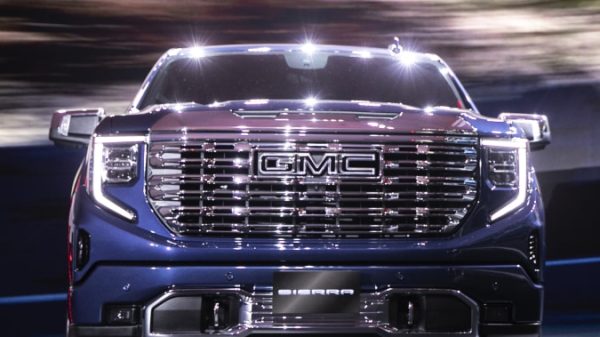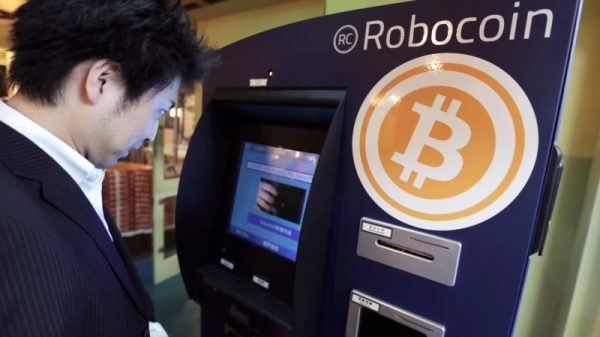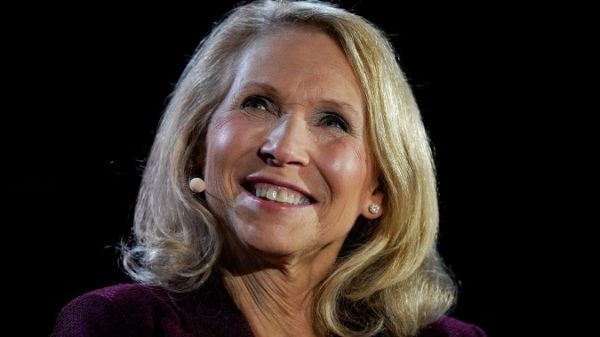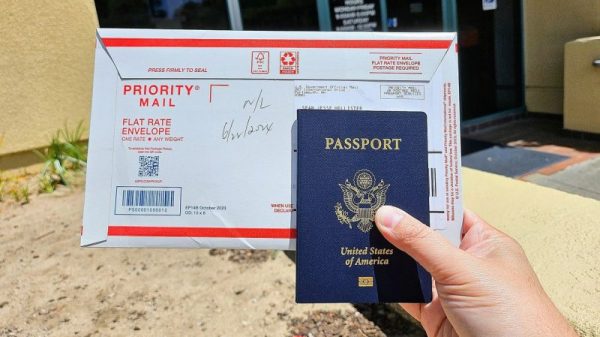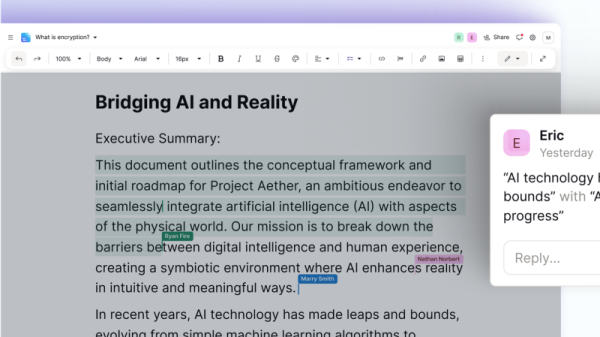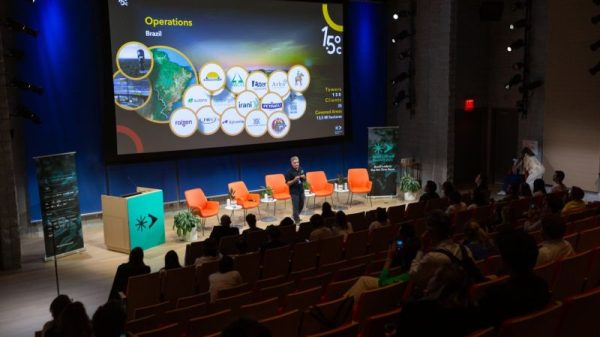Donald Trump’s presidential campaign notched a major victory Saturday when members of the California Republican executive committee voted to parcel out convention delegates based on the statewide vote next year — doing away with the state’s longtime system of awarding them by congressional district, which had been perceived as a more level playing field for lower-tiered candidates.
The new rules give Trump a shot at clinching all of the state’s 169 delegates — more than any other state — while at the same time making it harder for a challenger like Florida Gov. Ron DeSantis (R) to make it a two-person race.
The dramatic shift in the rules, which came during a closed-door meeting Saturday in Irvine, was denounced as an underhanded political maneuver by allies of DeSantis, Trump’s leading opponent for the nomination, who tried to prevent the change and are now reconsidering their investments in the state.
“Smoke-filled backrooms do not reflect the will of or benefit voters in any state. Yet across the country games are afoot to enhance the potential outcome of primary elections for one former president who half of the Republican electorate no longer wants as the party leader,” Ken Cuccinelli, founder of the pro-DeSantis super PAC Never Back Down, said in a statement. “Even with these asinine primary rules changes, we remain confident Governor DeSantis will become the Republican nominee and 47th president of the United States.”
Several other key states have been making revisions to their delegate selection rules that could benefit Trump, after top Trump advisers launched an early effort to court state officials who have significant autonomy in deciding how their states select delegates.
Louisiana Republicans have moved to strengthen the role of candidates in selecting delegates, a change that comes after Trump won the state primary in 2016 but was not able to secure a majority of the delegates. Nevada Republicans have said they will not recognize the statewide primary, which Democrats voted to set for Feb. 6, but will instead hold a smaller party-run caucus around the same time to pick delegates — a move that will narrow the number of voters who are decisive in that state. In Michigan, where Democrats are forcing a primary in February in violation of Republican rules, the state party has said it expects to award most of its delegates at party-run caucuses in early March.
In Idaho, a Trump-friendly state where lawmakers eliminated the March presidential primary as a cost-saving measure, the GOP is now planning to hold a caucus before Super Tuesday that would make it the fifth state on the primary calendar. Republicans in North Dakota, where Gov. Doug Burgum (R) has launched his own presidential campaign, have also left open the possibility of moving that state’s caucuses to the first days of March, before most states enter the process.
The Trump campaign immediately expressed support Saturday for the California rules change, highlighting language that will allow any candidate who gets more than 50 percent of the statewide vote on March 5 to claim all of the state’s 169 delegates. County election officials will start mailing ballots on Feb. 5, 2024, before the Nevada primary but after the expected dates of the Iowa caucuses and the New Hampshire primary.
“We are pleased the California Republican Party readopted a winner-take-all provision, and we look forward to competing across California to win all of its delegates, just as President Trump did in 2016 and 2020. Always Back Down and Ron DeSantis suffered a humiliating defeat as they tried to manipulate the party rules,” Trump campaign spokesman Steven Cheung, intentionally misnaming the DeSantis super PAC, said in a statement. “President Trump looks forward to working with the California Republican Party to Make America Great Again as he continues to dominate statewide polling by over 50%.”
The most recent RealClearPolitics average of state polls in California shows Trump with 49 percent of the vote, compared with 23 percent for DeSantis and 7 percent for former vice president Mike Pence. No other candidate is polling over 5 percent in the state.
Top GOP officials in California had argued that the rules change was necessary to align the state’s delegate selection process with Republican National Committee guidelines, which require states that fall early on the primary calendar to award some of their delegates proportionally. Under the California GOP’s new rules, any candidate who receives a majority of votes statewide — 50 percent plus 1 — will win all of the at-large and congressional district delegates, as well as the alternates.
If no candidate wins a majority in California, the delegates will be apportioned among all of the candidates in a way that reflects the statewide vote. Even if Trump does not clear the threshold that allows him to win all the state’s delegates, he could be helped by the fact that many of the lower-tier candidates will be able to pick up delegates across the state, which could prolong the primary and complicate the hopes of a top rival like DeSantis.
“If Trump is cruising into Super Tuesday — and sitting well in most states, including California, that take over 50 percent of the vote — then it’s great for him and it will end the nomination process,” said California Republican strategist Rob Stutzman, referring to a blizzard of primaries on March 5 that will include California. “However, if he doesn’t get 50 percent, it gives a substantial delegate haul to any number of candidates. Then it’s a scenario where the race could extend well beyond Super Tuesday. … It seems a little risky. It’s aggressive for the Trump campaign to want this change.”
California — a state where it is exorbitantly expensive to advertise on television — has long awarded delegates with a winner-take-all system by congressional district, giving lower-tier and more moderate Republican candidates a chance to build out their field programs as they seek delegates in districts that are favorable to them. But the Golden State delegate tallies often haven’t mattered, because the state’s primary fell later on the presidential nominating calendar.
Under the old system of apportionment by congressional district, campaigns “would have been hyperfocusing and targeting certain congressional districts where you could do well as a candidate,” said Tim Lineberger, a California political consultant who worked for the Trump campaign in the 2016 cycle but is now unaligned with any campaign.
“You’ll probably see more TV versus ground campaigns” under the new rules, he said. “But California is notoriously expensive, so I think it’s going to be cost-prohibitive to some of the lower-polling candidates.”
California GOP Chairwoman Jessica Millan Patterson said in a statement after Saturday’s vote that the rules change means that “Republican presidential candidates will not only be encouraged to spend real time campaigning in our state and making their case to voters, but Republican voters will equally be encouraged to turn out to support their chosen candidate to help them win delegates.”
In Nevada, several Silver State political consultants said there are concerns that the lack of clarity around when that state will hold its caucus — as well as the potential voter confusion over the fact that there will be both a caucus and a primary — could diminish the state’s influence after years in which Nevada proudly touted its status as the “first in the West” state.
The state’s GOP chairman, Michael J. McDonald, has long had a close relationship with Trump, and the former president recently endorsed two people who won the county chairman jobs in the state’s two most populous counties, Washoe and Clark. McDonald did not return calls seeking clarity on Nevada’s process.
The state is considered the most Trump-friendly of the early primary contests, in part because of its lower share of college-educated and churchgoing voters. But Nevada is also notoriously difficult to poll because of the state’s transient population. Republican voters have been loyal to Trump, who lost the state to Biden by 33,596 votes in 2020, and he has maintained his strength in rural areas. But his style has alienated many moderate voters in the narrowly divided state, contributing to his loss in the 2020 presidential contest.
Sigal Chattah, a Republican committeewoman in Nevada who has not made an endorsement in the presidential primary, said the decision to shun the state primary was not made to favor any candidate or campaign.
Nevada Republicans objected to the Democrats’ move to force the state to hold a primary, which they do not want to participate in. Instead they are pursuing legal action to ensure they can hold a GOP caucus and award delegates through that process.
“Without a disclosure telling voters that participation in the [primary] is irrelevant for the nomination, that is the grossest exercise of voter suppression,” she said. “You are defrauding Nevada Republican voters.”
The leadership of the Idaho Republican Party, which is closely aligned with Trump, recently voted to choose its delegates through a caucus system — a move that could also benefit the former president. The Republican State Central Committee adopted a proposal at its June meeting to schedule the caucus so that Idaho Republicans would vote fifth among the early contests and before Super Tuesday, though no formal date has been set. That could give Trump, who won the state with nearly 64 percent of the vote in the 2020 presidential contest, another early win next year.
Some members of the central committee also want the state legislature to restore Idaho’s March presidential primary, which was eliminated by the legislature to save more than $2 million. The central committee passed a resolution asking lawmakers to restore the primary to March, but the governor would have to call a special session to make that possible. Idaho Republican Chairwoman Dorothy Moon, who did not respond to calls for comment, said in a statement after the June meeting that the caucus proposal adopted was a strike against the “wealthy and powerful” who “want to manipulate our electoral systems to rig outcomes that favor their interests.”
The three senior campaign advisers to Trump all have significant delegate-counting experience. In 2016, Susie Wiles served on the convention rules committee, Chris LaCivita helped run the delegate process for the Republican National Committee, and Brian Jack served as the Trump campaign’s delegate director.
Jack worked for House Speaker Kevin McCarthy, the most powerful Republican in California, during the 2022 midterm elections. They have encouraged Trump to build close relationships with state party chairs, whom the former president has been known to call regularly, invite to rallies and sometimes host at Mar-a-Lago.
DeSantis spokesman Andrew Romeo said: “We’re putting an organization together that can win in any state, in any format, anytime, and anywhere. Game on.”
Donald Trump’s presidential campaign notched a major victory Saturday when members of the California Republican executive committee voted to parcel out convention delegates based on the statewide vote next year — doing away with the state’s longtime system of awarding them by congressional district, which had been perceived as a more level playing field for lower-tiered candidates.
The new rules give Trump a shot at clinching all of the state’s 169 delegates — more than any other state — while at the same time making it harder for a challenger like Florida Gov. Ron DeSantis (R) to make it a two-person race.
The dramatic shift in the rules, which came during a closed-door meeting Saturday in Irvine, was denounced as an underhanded political maneuver by allies of DeSantis, Trump’s leading opponent for the nomination, who tried to prevent the change and are now reconsidering their investments in the state.
“Smoke-filled backrooms do not reflect the will of or benefit voters in any state. Yet across the country games are afoot to enhance the potential outcome of primary elections for one former president who half of the Republican electorate no longer wants as the party leader,” Ken Cuccinelli, founder of the pro-DeSantis super PAC Never Back Down, said in a statement. “Even with these asinine primary rules changes, we remain confident Governor DeSantis will become the Republican nominee and 47th president of the United States.”
Several other key states have been making revisions to their delegate selection rules that could benefit Trump, after top Trump advisers launched an early effort to court state officials who have significant autonomy in deciding how their states select delegates.
Louisiana Republicans have moved to strengthen the role of candidates in selecting delegates, a change that comes after Trump won the state primary in 2016 but was not able to secure a majority of the delegates. Nevada Republicans have said they will not recognize the statewide primary, which Democrats voted to set for Feb. 6, but will instead hold a smaller party-run caucus around the same time to pick delegates — a move that will narrow the number of voters who are decisive in that state. In Michigan, where Democrats are forcing a primary in February in violation of Republican rules, the state party has said it expects to award most of its delegates at party-run caucuses in early March.
In Idaho, a Trump-friendly state where lawmakers eliminated the March presidential primary as a cost-saving measure, the GOP is now planning to hold a caucus before Super Tuesday that would make it the fifth state on the primary calendar. Republicans in North Dakota, where Gov. Doug Burgum (R) has launched his own presidential campaign, have also left open the possibility of moving that state’s caucuses to the first days of March, before most states enter the process.
The Trump campaign immediately expressed support Saturday for the California rules change, highlighting language that will allow any candidate who gets more than 50 percent of the statewide vote on March 5 to claim all of the state’s 169 delegates. County election officials will start mailing ballots on Feb. 5, 2024, before the Nevada primary but after the expected dates of the Iowa caucuses and the New Hampshire primary.
“We are pleased the California Republican Party readopted a winner-take-all provision, and we look forward to competing across California to win all of its delegates, just as President Trump did in 2016 and 2020. Always Back Down and Ron DeSantis suffered a humiliating defeat as they tried to manipulate the party rules,” Trump campaign spokesman Steven Cheung, intentionally misnaming the DeSantis super PAC, said in a statement. “President Trump looks forward to working with the California Republican Party to Make America Great Again as he continues to dominate statewide polling by over 50%.”
The most recent RealClearPolitics average of state polls in California shows Trump with 49 percent of the vote, compared with 23 percent for DeSantis and 7 percent for former vice president Mike Pence. No other candidate is polling over 5 percent in the state.
Top GOP officials in California had argued that the rules change was necessary to align the state’s delegate selection process with Republican National Committee guidelines, which require states that fall early on the primary calendar to award some of their delegates proportionally. Under the California GOP’s new rules, any candidate who receives a majority of votes statewide — 50 percent plus 1 — will win all of the at-large and congressional district delegates, as well as the alternates.
If no candidate wins a majority in California, the delegates will be apportioned among all of the candidates in a way that reflects the statewide vote. Even if Trump does not clear the threshold that allows him to win all the state’s delegates, he could be helped by the fact that many of the lower-tier candidates will be able to pick up delegates across the state, which could prolong the primary and complicate the hopes of a top rival like DeSantis.
“If Trump is cruising into Super Tuesday — and sitting well in most states, including California, that take over 50 percent of the vote — then it’s great for him and it will end the nomination process,” said California Republican strategist Rob Stutzman, referring to a blizzard of primaries on March 5 that will include California. “However, if he doesn’t get 50 percent, it gives a substantial delegate haul to any number of candidates. Then it’s a scenario where the race could extend well beyond Super Tuesday. … It seems a little risky. It’s aggressive for the Trump campaign to want this change.”
California — a state where it is exorbitantly expensive to advertise on television — has long awarded delegates with a winner-take-all system by congressional district, giving lower-tier and more moderate Republican candidates a chance to build out their field programs as they seek delegates in districts that are favorable to them. But the Golden State delegate tallies often haven’t mattered, because the state’s primary fell later on the presidential nominating calendar.
Under the old system of apportionment by congressional district, campaigns “would have been hyperfocusing and targeting certain congressional districts where you could do well as a candidate,” said Tim Lineberger, a California political consultant who worked for the Trump campaign in the 2016 cycle but is now unaligned with any campaign.
“You’ll probably see more TV versus ground campaigns” under the new rules, he said. “But California is notoriously expensive, so I think it’s going to be cost-prohibitive to some of the lower-polling candidates.”
California GOP Chairwoman Jessica Millan Patterson said in a statement after Saturday’s vote that the rules change means that “Republican presidential candidates will not only be encouraged to spend real time campaigning in our state and making their case to voters, but Republican voters will equally be encouraged to turn out to support their chosen candidate to help them win delegates.”
In Nevada, several Silver State political consultants said there are concerns that the lack of clarity around when that state will hold its caucus — as well as the potential voter confusion over the fact that there will be both a caucus and a primary — could diminish the state’s influence after years in which Nevada proudly touted its status as the “first in the West” state.
The state’s GOP chairman, Michael J. McDonald, has long had a close relationship with Trump, and the former president recently endorsed two people who won the county chairman jobs in the state’s two most populous counties, Washoe and Clark. McDonald did not return calls seeking clarity on Nevada’s process.
The state is considered the most Trump-friendly of the early primary contests, in part because of its lower share of college-educated and churchgoing voters. But Nevada is also notoriously difficult to poll because of the state’s transient population. Republican voters have been loyal to Trump, who lost the state to Biden by 33,596 votes in 2020, and he has maintained his strength in rural areas. But his style has alienated many moderate voters in the narrowly divided state, contributing to his loss in the 2020 presidential contest.
Sigal Chattah, a Republican committeewoman in Nevada who has not made an endorsement in the presidential primary, said the decision to shun the state primary was not made to favor any candidate or campaign.
Nevada Republicans objected to the Democrats’ move to force the state to hold a primary, which they do not want to participate in. Instead they are pursuing legal action to ensure they can hold a GOP caucus and award delegates through that process.
“Without a disclosure telling voters that participation in the [primary] is irrelevant for the nomination, that is the grossest exercise of voter suppression,” she said. “You are defrauding Nevada Republican voters.”
The leadership of the Idaho Republican Party, which is closely aligned with Trump, recently voted to choose its delegates through a caucus system — a move that could also benefit the former president. The Republican State Central Committee adopted a proposal at its June meeting to schedule the caucus so that Idaho Republicans would vote fifth among the early contests and before Super Tuesday, though no formal date has been set. That could give Trump, who won the state with nearly 64 percent of the vote in the 2020 presidential contest, another early win next year.
Some members of the central committee also want the state legislature to restore Idaho’s March presidential primary, which was eliminated by the legislature to save more than $2 million. The central committee passed a resolution asking lawmakers to restore the primary to March, but the governor would have to call a special session to make that possible. Idaho Republican Chairwoman Dorothy Moon, who did not respond to calls for comment, said in a statement after the June meeting that the caucus proposal adopted was a strike against the “wealthy and powerful” who “want to manipulate our electoral systems to rig outcomes that favor their interests.”
The three senior campaign advisers to Trump all have significant delegate-counting experience. In 2016, Susie Wiles served on the convention rules committee, Chris LaCivita helped run the delegate process for the Republican National Committee, and Brian Jack served as the Trump campaign’s delegate director.
Jack worked for House Speaker Kevin McCarthy, the most powerful Republican in California, during the 2022 midterm elections. They have encouraged Trump to build close relationships with state party chairs, whom the former president has been known to call regularly, invite to rallies and sometimes host at Mar-a-Lago.
DeSantis spokesman Andrew Romeo said: “We’re putting an organization together that can win in any state, in any format, anytime, and anywhere. Game on.”


